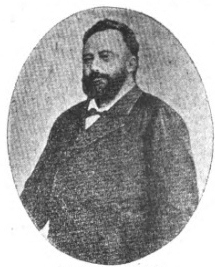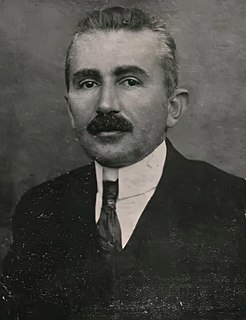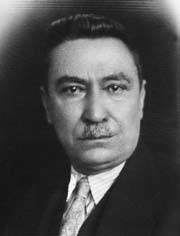 W
WAbdullah I bin Al-Hussein was the ruler of Jordan and its predecessor state, Transjordan, from 1921 until his assassination in 1951. He was Emir of Transjordan from 11 April 1921 to 25 May 1946 under a British protectorate, and was king of an independent nation from 25 May 1946 until his assassination. He was a 38th-generation direct descendant of Muhammad, as he belongs to the Hashemite family.
 W
WFejzi Alizoti, also referred to as Fejzi Bey Alizotti, was an Ottoman and later Albanian politician who served as the Chairman of the Central Administration of Albania from January 1916 to October 1918. He never held the title "prime minister" as is commonly misconceived.
 W
WCelalettin Arif (1875–1928) was an Ottoman-born Turkish lawyer, politician, government minister and diplomat.
 W
WShukri al-Asali was a prominent Syrian politician, nationalist leader, and senior inspector in the Ottoman government, in addition to being a ranking member of the Council of Notables. He served in the Ottoman parliament from 1911 until April 1912.
 W
WRıza Tevfik Bey was an Ottoman and later Turkish philosopher, poet, politician of liberal signature and a community leader of the late-19th-century and early-20th-century. A polyglot, he is most remembered in Turkey for being one of the four Ottoman signatories of the disastrous Treaty of Sèvres, for which reason he was included in 1923 among the 150 personae non gratae of Turkey, and he spent 20 years in exile until he was given amnesty by Turkey in 1943.
 W
WEmmanuel Carasso or Emanuel Karasu was an Ottoman lawyer and a member of the prominent Sephardic Jewish Carasso family of Ottoman Salonica. He was also a prominent member of the Young Turks. The name is also spelled Karaso, Karassu, and Karasso. The form Karasu is a Turkification of his name, meaning literally 'black water'.
 W
WNaim Bey Frashëri, more commonly Naim Frashëri, was an Albanian patriot, historian, journalist, poet, rilindas and translator who was proclaimed national poet of Albania. He is regarded as the pioneer of modern Albanian literature and one of the most influential Albanian cultural icons of the 19th century.
 W
WFaiz El-Ghusein (1883–1968) was a sheikh from the Hauran, and a former official of the Turkish Government. He is most widely remembered as the author of Martyred Armenia, an alleged eyewitness account of Armenian Genocide.
 W
WMiralay Hamdi Bey, Hamdi Baba, also known as "Kambur (humpback) Hamdi" (1861–1927) and Hamdi Bey was an Ottoman officer and politician of Albanian origin. Hamdi Bey was a colonel of the Ottoman army and later a deputy of the Ottoman parliament.
 W
WHayreddin Pasha was an Ottoman-Tunisian politician who was born to a Circassian family. First serving as Beylerbeyi of Ottoman Tunisia, he later achieved the high post of Grand Vizier of the Ottoman Empire. He was a political reformer during a period of growing European ascendancy. was a pragmatic activist who reacted against poor conditions in Muslim states, and looked to Europe for solutions. He applied the Islamic concept of "maṣlaḥah", to economic issues. He emphasized the central role of justice and security in economic development. He was a major advocate of "tanẓīmāt" for Tunisia's political and economic systems.
 W
WAndronikos Kantakouzenos, also known as Mihaloğlu Derviş, was an Ottoman Greek entrepreneur and political figure, primarily active in Wallachia and Moldavia. He was the son of Michael Kantakouzenos Şeytanoğlu, a powerful merchant of the Ottoman Empire, executed by Murad III in 1578. Forced to honor his father's outstanding debt, and briefly imprisoned as a galley slave, he rebuilt the fortune through commerce and political intrigues. In the 1590s, he was continuing his father's involvement as kingmaker for both Wallachia and Moldavia, acting as patron for a succession of Hospodars: Stephen the Deaf, Petru Cercel, Aaron the Tyrant and Peter the Lame all benefited from his financing. From 1591, he involved himself directly in the administration of both countries. Integrated within Moldo–Wallachian boyardom, he was Vistier, and then the first-ever Ban of Oltenia to be appointed directly by the Ottomans.
 W
WAlexander Karatheodori Pasha was an Ottoman Greek statesman and diplomat. He was involved in diplomatic affairs following the aftermath of the Russo-Turkish War of 1877–78.
 W
WPavlos Karolidis or Karolides was one of the most eminent Greek historians of the late 19th and early 20th centuries.
 W
WShahin bey Kolonja was an Albanian journalist, politician, and member of the Ottoman Parliament during its Second Constitutional Era.
 W
WMufid bej Libohova was an Albanian economist, diplomat and politician and one of the delegates at the Assembly of Vlorë where the Albanian Declaration of Independence took place. He served as the first Minister of Interior of Albania, during the Provisional Government of Albania and since then has held different government positions on nine occasions between 1913–1927, holding the positions of Justice Minister, Minister of the Interior, Minister of Finances, and Minister of Culture.
 W
WMazhar Müfit Bey was a Turkish civil servant and politician. In 1934 he assumed the surname Kansu.
 W
WCemal Mersinli, also known as Mehmed Djemal Pasha, Mersinli Djemal, or Djemal Kuchuk was a general of the Ottoman and Turkish armies and a politician of the Ottoman Empire and the Republic of Turkey.
 W
WMustafa Sabri Effendi was the last Shaykh al-Islām of the Ottoman Empire. He is known for his opinions condemning the Turkish nationalist movement under Kemal Atatürk. Due to his resistance to Atatürk, he lived half of his life in exile in various countries, and died in Egypt.
 W
WTraianos Nallis was an important Greek notable and politician.
 W
WGabriel (Kapriel) Efendi Noradunkyan was an Ottoman Armenian statesman and bureaucrat. He served as the Minister of Trade in 1908 and Minister of Foreign Affairs of the Ottoman Empire from July 22, 1912 to January 23, 1913 during the reign of Mehmed V and the prime ministership of Ahmed Muhtar Pasha and Kâmil Pasha.
 W
WKrikor Odian was an Ottoman Armenian jurist, politician, and writer.
 W
WTalat Avni Özüdoğru was a military officer of the Ottoman Army, a politician of the Ottoman Empire and the Republic of Turkey. He was an elder brother of Şefik Avni (Özüdoğru).
 W
WMehmed Hâdî Pasha was an Ottoman general and statesman, who was a prominent member of the Liberal Union. He is most remembered in Turkey for being one of the four Ottoman signatories of the disastrous Treaty of Sèvres, for which reason he was included in 1923 among the 150 personae non gratae of Turkey. He died in exile in 1932.
 W
WMehmed Rauf Pasha was an Ottoman senator and liberal politician, who was a member of the Freedom and Accord Party.
 W
WRosa Plaveva, née Varnalieva, was an Ottoman and Yugoslav socialist and suffragette from present-day North Macedonia.
 W
WHasan Prishtina, originally known as Hasan Berisha, was an Ottoman, later Albanian politician, who served as the 8th Prime Minister of Albania in December 1921.
 W
WNahabed Rusinian was a prominent Ottoman Armenian poet, publicist, physician, orator, writer, political activist, translator, and contributor to the Armenian National Constitution.
 W
WKerim Sebatî (1870–1942) was an Ottoman physician and politician, who was one of the original founders and a member of the Committee of the Ottoman Union, but he soon left when it got transformed into a political organisation by the nationalists.
 W
WSheikh As'ad Shukeiri, also transcribed al-Shuqayri, Shuqeiri, Shukeiry), 1860–1940, was a Palestinian religious and political leader in Acre, and the Ottoman-appointed Qadi from 1914 to 1918. Kamil al-Husayni was the Hanafi Mufti at the time and considered to be pro-British. Shukeiri was pro-Ottoman, favoring that Palestine continue to be part of the Ottoman Empire and in 1908 and 1912, he was elected to the Ottoman parliament.
 W
WTalib Pasha bin Rajab Al-Naqib Al-Refa'i was an Iraqi politician, who became the first Minister of Interior in Iraq
 W
WHamdullah Suphi Tanrıöver was a highly influential Turkish poet, intellectual, diplomat and politician. He adopted his surname Tanrıöver after the Turkish Surname Law was enacted in 1934.
 W
WAhmet Ferit Tek was an Ottoman-born Turkish military officer, academic, politician, government minister and diplomat.
 W
WGegham Ter-Karapetian (1865-1918), better known by his pen name Msho Gegham, is a renowned Armenian writer and politician.
 W
WHilmi Uran (1886–1957) was a former Turkish politician and government minister.
 W
WSyrja Vlora (1860–1940), usually referred as Syrja Bey Vlora, was an Ottoman Albanian politician and one of the active figures of the Albanian Declaration of Independence in 1912, and one of the delegates of the Assembly of Vlorë.
 W
WYusuf Ziya Pasha, also known as Youssouf Zia Pacha was an Ottoman politician and government minister and was one of the figureheads of the Committee of Union and Progress (CUP). He was the Ottoman ambassador to the United States from June 14, 1910 to 1914.
 W
WZiya Pasha, the pseudonym of Abdul Hamid Ziyaeddin, was an Ottoman writer, translator and administrator. He was, along with İbrahim Şinasi and Namık Kemal, one of the most important authors during the Tanzimat period of the Ottoman Empire.
 W
WKrikor Zohrab was an influential Armenian writer, politician, and lawyer from Constantinople. At the onset of the Armenian Genocide he was arrested by the Turkish government and sent to appear before a military court in Diyarbakır. En route, at a locality called Karaköprü or Şeytanderesi on the outskirts of Urfa, he was murdered by a band of known brigands under the leadership of Çerkez Ahmet, Halil and Nazım some time between 15 July and 20 July 1915